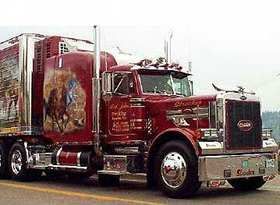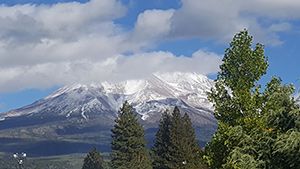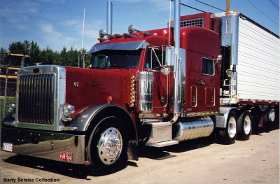Accident While In Training.
Topic 20019 | Page 3

Some of us are missing the fact that he did have his CDL. Both he and the trainer would have been in some really major trouble if he only had a permit.
I think what it boils down to is that he made a rookie mistake, very easy to do, especially when you have a trainer who is not involved in the training process, but mostly involved in utilizing his trainee as a means to personal gain. What is appalling in this whole scenario is that there are others at the company who have to be considered complicit in this whole act of negligence.
I agree completely.
CDL:
Commercial Driver's License (CDL)
A CDL is required to drive any of the following vehicles:
- Any combination of vehicles with a gross combined weight rating (GCWR) of 26,001 or more pounds, providing the gross vehicle weight rating (GVWR) of the vehicle being towed is in excess of 10,000 pounds.
- Any single vehicle with a GVWR of 26,001 or more pounds, or any such vehicle towing another not in excess of 10,000 pounds.
- Any vehicle, regardless of size, designed to transport 16 or more persons, including the driver.
- Any vehicle required by federal regulations to be placarded while transporting hazardous materials.
To me it also demonstrates that some of those three week training systems may not be adequate. If he was at another company the next week he could have been solo.
Teaming training is hard and exhausting on both the trainer and trainee. I can totally see how this can happen.
I'm sorry and hope you find someplace. I know a guy who jack knifed and only CR England would hire him. Not the best pay scale, but perhaps live with it for a short time then move on.
Good luck
HOS:
Hours Of Service
HOS refers to the logbook hours of service regulations.Here's one of the few stories out there: Semi truck overturns on I85 ramp
There's not much info other than it happened, speed was a factor, and injuries weren't serious. Like others, I'm curious as to what stage of training he was in.

Hans Solo wrote:
Here's one of the few stories out there: Semi truck overturns on I85 ramp
There's not much info other than it happened, speed was a factor, and injuries weren't serious. Like others, I'm curious as to what stage of training he was in.
He was 2.5 weeks into road training when the accident occurred. Reference his original post.

If you are in the south, Carolina Cargo is know to give second chances.

Personally, this is why I think trainers need to be on salary. I'm not saying, in this instance, it is what happened, but, often you hear of trainers sleeping while the trainee is driving, in order to maximize their income.
I can totally understand why they do it, but I disagree with the practice of it. To me, in order to ensure quality training, they need to put trainers on salary. I would think that they could give them a base of their com rate x 2600 miles per week, then, when the trainee graduates, they get a bonus upon successfully completing their road test, and another bonus after 3 months of safe driving.
I say take the temptation away, trainers should be there to make sure they turn out quality drivers. They also need to compensated well for the dangers of being in a truck with an inexperienced driver.
Sambo, I have no issue at all with what you're saying but unfortunately a lot of trainers are lease drivers. In fact, that's part of the business model for these large carriers. This is how they help their lease drivers succeed. The company will supply the lease driver with a student to train at a reduced wage. The lease driver makes more money, the company gets more trainers, and the student gets trained. This is a pretty common practice now.
I don't know how that salary model would be worked out with a lease driver. A salary is always a "disincentive" to do more work, as opposed to mileage pay being an incentive to do more work. If you put them on salary they're going to want to drive a certain number of miles and then quit. There's no sense in driving any further if you can't make more money.
This has been one of those neverending issues in trucking that no one has ever really seemed to figure out. With all of the things the DOT regulates it amazes me that they won't set some sort of minimum training standards for truck drivers. Truck drivers should get a significant portion of their road training while they're still in school, not out in the real world hauling freight.
And it's odd because the trucking industry has always been clamoring for new drivers, and yet the length of private schooling is so short that the government won't back student loans the way they will for other trade schools. I went to school for a year for Harley Davidson mechanics and was given a full loan from the government for $12,000 to cover the entire thing. I had a part time job during schooling to cover my living expenses.
If the DOT would require a minimum amount of training time, private schooling would then qualify for federal backing and students could get loans to go to private schools. They would spend 3 - 6 months there, depending on how long the minimum requirement is. Then the students can relax and get their road training at school instead of in the real world trying to hustle and make money.
This has been an issue for decades. It doesn't seem like you'd need a team of rocket scientists to come up with a better system. But somehow here we are still to this day and everyone is walking that fine line between safety and productivity.
DOT:
Department Of Transportation
A department of the federal executive branch responsible for the national highways and for railroad and airline safety. It also manages Amtrak, the national railroad system, and the Coast Guard.
State and Federal DOT Officers are responsible for commercial vehicle enforcement. "The truck police" you could call them.
HOS:
Hours Of Service
HOS refers to the logbook hours of service regulations.
Sambo, I have no issue at all with what you're saying but unfortunately a lot of trainers are lease drivers. In fact, that's part of the business model for these large carriers. This is how they help their lease drivers succeed. The company will supply the lease driver with a student to train at a reduced wage. The lease driver makes more money, the company gets more trainers, and the student gets trained. This is a pretty common practice now.
I don't know how that salary model would be worked out with a lease driver. A salary is always a "disincentive" to do more work, as opposed to mileage pay being an incentive to do more work. If you put them on salary they're going to want to drive a certain number of miles and then quit. There's no sense in driving any further if you can't make more money.
This has been one of those neverending issues in trucking that no one has ever really seemed to figure out. With all of the things the DOT regulates it amazes me that they won't set some sort of minimum training standards for truck drivers. Truck drivers should get a significant portion of their road training while they're still in school, not out in the real world hauling freight.
And it's odd because the trucking industry has always been clamoring for new drivers, and yet the length of private schooling is so short that the government won't back student loans the way they will for other trade schools. I went to school for a year for Harley Davidson mechanics and was given a full loan from the government for $12,000 to cover the entire thing. I had a part time job during schooling to cover my living expenses.
If the DOT would require a minimum amount of training time, private schooling would then qualify for federal backing and students could get loans to go to private schools. They would spend 3 - 6 months there, depending on how long the minimum requirement is. Then the students can relax and get their road training at school instead of in the real world trying to hustle and make money.
This has been an issue for decades. It doesn't seem like you'd need a team of rocket scientists to come up with a better system. But somehow here we are still to this day and everyone is walking that fine line between safety and productivity.
This industries' "training standards" are crap... period. A few years of driving experience should not qualify you to be a "trainer." Just because you can drive, doesn't mean you can/should train.
Training should never be conducted in a "team environment." If companies can't/won't provide the proper personnel and environment for training... they just shouldn't even try.
DOT:
Department Of Transportation
A department of the federal executive branch responsible for the national highways and for railroad and airline safety. It also manages Amtrak, the national railroad system, and the Coast Guard.
State and Federal DOT Officers are responsible for commercial vehicle enforcement. "The truck police" you could call them.
HOS:
Hours Of Service
HOS refers to the logbook hours of service regulations.This industries' "training standards" are crap... period. A few years of driving experience should not qualify you to be a "trainer." Just because you can drive, doesn't mean you can/should train.
Training should never be conducted in a "team environment." If companies can't/won't provide the proper personnel and environment for training... they just shouldn't even try.
I also have no argument with any of that. I wouldn't mind if the mentoring was a team environment, as long as the student had a good amount of road time in a solo environment first.
Like Prime and some others have two phases of training. The first phase the truck is supposed to be dispatched solo, with the student doing most or all of the driving and the mentor riding along in the passenger seat. Then the second phase is done as a team.
I'm fine with that scenario. As long as the student has a good amount of time on the road as a solo driver and they're ready to run team then let em have at it. But no one should be running team right away after getting their CDL.
CDL:
Commercial Driver's License (CDL)
A CDL is required to drive any of the following vehicles:
- Any combination of vehicles with a gross combined weight rating (GCWR) of 26,001 or more pounds, providing the gross vehicle weight rating (GVWR) of the vehicle being towed is in excess of 10,000 pounds.
- Any single vehicle with a GVWR of 26,001 or more pounds, or any such vehicle towing another not in excess of 10,000 pounds.
- Any vehicle, regardless of size, designed to transport 16 or more persons, including the driver.
- Any vehicle required by federal regulations to be placarded while transporting hazardous materials.
New Reply:
New! Check out our help videos for a better understanding of our forum features

















Preview:
This topic has the following tags:
Company Trainers GPS Systems On The Road In Training Reports From CDL Training Trip Planning Truck Driver Training Trucking Accidents







 TT On Facebook
TT On Facebook
Some of us are missing the fact that he did have his CDL. Both he and the trainer would have been in some really major trouble if he only had a permit.
I think what it boils down to is that he made a rookie mistake, very easy to do, especially when you have a trainer who is not involved in the training process, but mostly involved in utilizing his trainee as a means to personal gain. What is appalling in this whole scenario is that there are others at the company who have to be considered complicit in this whole act of negligence.
CDL:
Commercial Driver's License (CDL)
A CDL is required to drive any of the following vehicles: